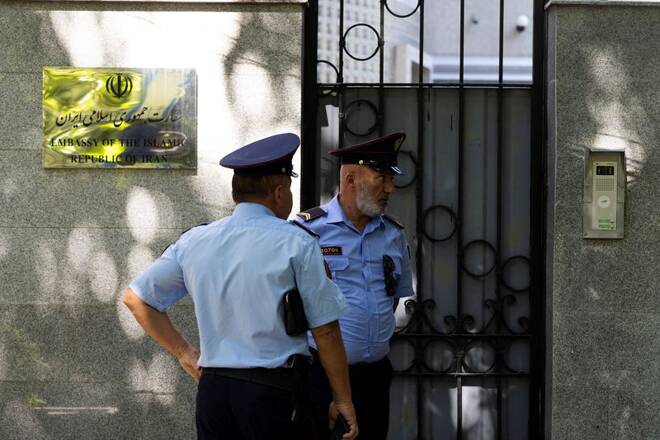Advertisement
Advertisement
Albanian police search empty Iranian embassy after papers burned
By:
By Fatos Bytyci and Florion Goga TIRANA (Reuters) - Iranian diplomats burned documents in the early morning on Thursday hours before they were to leave the country after Albania cut diplomatic relations with Iran, accusing the Islamic Republic of an cyberattack in July.
By Fatos Bytyci and Florion Goga
TIRANA (Reuters) -Albanian counter-terrorism police searched the empty Iranian embassy in Tirana on Thursday, hours after Iranian diplomats burned papers inside the premises following the severing of diplomatic ties over a cyberattack.
Albania cut diplomatic relations with Iran on Wednesday, when Prime Minister Edi Rama blamed the cyberattack, which took place in July, on the Islamic Republic, and gave its diplomats 24 hours to close the embassy and leave the country.
The police, wearing masks and helmets and carrying automatic rifles, entered the building – situated just 200 metres (yards) from Rama’s office – after two cars with diplomatic plates had left, a Reuters reporter saw.
Thirty minutes later, the police were still inside.
The same reporter earlier saw a man inside the embassy throwing papers into a rusty barrel, with flames illuminating the walls of the three-story building.
In a rare video address on Wednesday, Rama said the July cyberattack has “threatened to paralyze public services, erase digital systems and hack into state records, steal government intranet electronic communication and stir chaos and insecurity in the country.”
Washington, Albania’s closest ally, also blamed Iran for the attack and promised to “take further action to hold Iran accountable for actions that threaten the security of a U.S. ally.”
Tehran condemned Tirana’s decision to cut ties, describing the reasons for the move as “baseless claims”.
Bilateral relations have been tense since 2014, when Albania accepted some 3,000 members of the exiled opposition group People’s Mujahideen Organization of Iran – also known by its Farsi name Mujahideen-e-Khalq – who have settled in a camp near Durres, the country’s main port.
Days after the July 15 cyberattack, Tirana-based media reported that hackers had published personal data of the opposition members that were saved in Albania’s state computers such as personal, social and security numbers, names and photos.
On Thursday morning, it appeared calm outside the embassy in Tirana located A black Audi with diplomatic car plates and darkened windows was seen going in and out as a police officer guarded the entrance.
(Reporting by Fatos Bytyci and Florion Goga; Editing by Kim Coghill and John Stonestreet)
About the Author
Reuterscontributor
Reuters, the news and media division of Thomson Reuters, is the world’s largest international multimedia news provider reaching more than one billion people every day. Reuters provides trusted business, financial, national, and international news to professionals via Thomson Reuters desktops, the world's media organizations, and directly to consumers at Reuters.com and via Reuters TV. Learn more about Thomson Reuters products:
Advertisement
